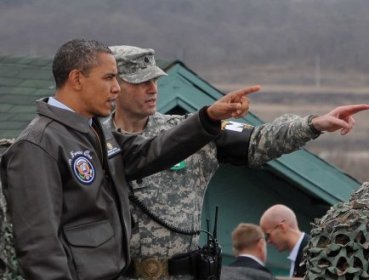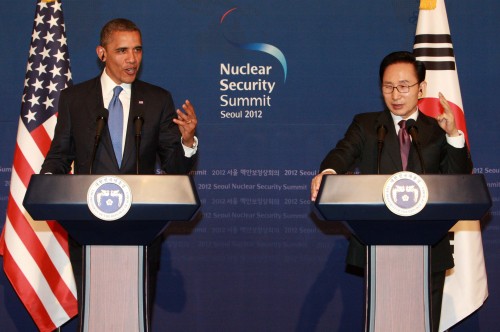Lee, Obama say Pyongyang will get nothing from it, but face deeper
isolation
The leaders of South Korea and the U.S. raised pressure on North Korea on
Sunday to withdraw its plan to launch a satellite on a long-range rocket next
month, stressing that the communist state would achieve “nothing from the
provocative act.”
President Lee Myung-bak and his U.S. counterpart Barack
Obama discussed regional security and other bilateral issues during their summit
talks held a day before the beginning of the two-day Nuclear Security
Summit.
U.S. President Barack Obama is
briefed by military officers at the Observation Post Ouellette in the
Demilitarized Zone near the Panmunjeom Joint Security Area on Sunday. Obama
arrived in Korea for the Nuclear Security Summit that begins Monday. (Lee
Sang-sub/The Korea Herald)
“The real consequence, should they go forward with the launch, is they will have
missed an opportunity ... an opportunity for them to take a different path from
the one they have been taking, which has resulted in not just hardships for its
people, but a state that is decades behind their counterparts in the region,”
Obama said during a joint press conference.
Earlier this month, the North
announced the launch plan intended to mark the centennial birthday of its late
founder Kim Il-sung, falling on April 15.
Observers say it is a cover
for testing its Taepodong-2 ballistic missile presumed to have a range of more
than 6,700 kilometers, far enough to hit parts of Alaska, but still incapable of
reaching the U.S. mainland.
Obama also made it clear that should the North press ahead with the plan, it
would be difficult to offer the “nutritional aid” package Washington pledged
last month in a breakthrough deal with Pyongyang.
“We’ve indicated to
them very directly ... that it will be difficult to move forward with that
package, if they’ve shown themselves unable to make commitments they made even a
month earlier,” he said.
As a pre-step for the resumption of the
multilateral denuclearization talks, Pyongyang agreed on Feb. 29 to temporarily
halt its uranium enrichment at its main nuclear complex in Yongbyon and put a
moratorium on missile and nuclear tests in exchange for 240,000 tons of
“nutritional assistance.”
Obama also indicated that the U.S. would have a
stringent monitoring system in place should it offer any aid to the impoverished
state, presaging tough negotiations with Pyongyang.
“A part of the
challenge for any nutrition aid package is that you make sure it actually goes
to the people that actually need it, and it doesn’t go to the some elites in the
country or their military. That requires monitors. It’s very difficult to have
monitors in the period of tension and friction,” he said.
Obama repeated
that the North would not be rewarded for “bad behavior.”
“Every time
North Korea has violated international resolutions, it’s resulted in further
isolation, tightening of sanctions, stronger enforcement, a greater support on
the part of the international community for enforcement. I suspect that will
happen this time as well,” he said.
President Lee stressed that there are
no differences between the allies concerning how to deal with North Korean
issues, saying that he would handle them in a “wise, calm” manner.
“It
will not be able to achieve any benefits, both domestically and internationally,
through the rocket launch. I want to say that that will, at last, result in its
further isolation,” Lee said.
Touching on the ongoing bilateral
consultations over revising a bilateral missile pact to allow Seoul to have
longer-range ballistic missiles, Obama appeared reluctant to be straightforward,
saying it was a working-level issue.
“There are no specific
pre-conditions, specific obstacles, around the missile range issue. Rather, it’s
a broader question of what are the needs in order for us to fulfill our enduring
goals around the alliance,” he said. “A lot of that is technical, a lot of that
takes place not at the presidential level, but rather at the military
level.”
Under a 2001 revision to the initial agreement, signed in 1979,
Seoul is banned from developing ballistic missiles with a range of more than 300
kilometers. It also stipulates that a payload must weigh no more than 500
kilograms, apparently to prevent the development of nuclear warheads.
As
North Korea currently has ballistic missiles with a range of over 3,000
kilometers, calls have risen here for the revision of the “outdated” pact with
some arguing that the pact has impeded South Korea’s rocket development both for
research and military purposes.
Regarding the impression of North Korea’s
new leader Kim Jong-un, Obama said he was still uncertain.
“It’s hard to
have an impression of Kim Jong-un, in part because the situation in North Korea
still appears uncertain. It’s not clear exactly who’s calling the shots, what
their long-term objectives are,” he said.
Lee echoed his view, saying
that time was needed to predict his leadership, although he expressed some
degree of frustration over the rocket launch plan.
Over the weekend, the
leaders of the U.N., India, Thailand and New Zealand also echoed South Korea’s
view that should the North push ahead with the plan, it would threaten peace and
security and violate a U.N. Security Council resolution against the use of
ballistic missile technology.
The leaders came here to attend the
security summit on Monday and Tuesday in Seoul. It is the U.S.-initiated premier
forum on preventing nuclear materials from falling into the hands of non-state
actors such as terrorists.
Earlier in the day, Obama paid a rare visit to
the Demilitarized Zone, the four-kilometer-wide buffer zone separating the two
Koreas, in a display of the U.S. commitment to the security of its key Asian
ally.
During the talks between Lee and Thai Prime Minister Yingluck
Shinawatra, the leaders called the launch plan a “threat to peace and stability
in the region,” stressing that the North should abide by the U.N. Security
Council Resolution 1874 that bans any use of ballistic missile
technology.
Indian Prime Minister Manmohan Singh and New Zealand’s Prime
Minister John Key also expressed their deep concerns over the North’s launch
plan, calling for it to comply with the U.N. resolution.
On the sidelines
of the nuclear summit, which will bring together leaders of more than 50 nations
and four global organizations such as the U.N. and EU, leaders are expected to
discuss the North Korea nuclear issue, although nonproliferation is not among
the main agenda items.
http://www.koreaherald.com/national/Detail.jsp?newsMLId=20120325000315




No comments:
Post a Comment